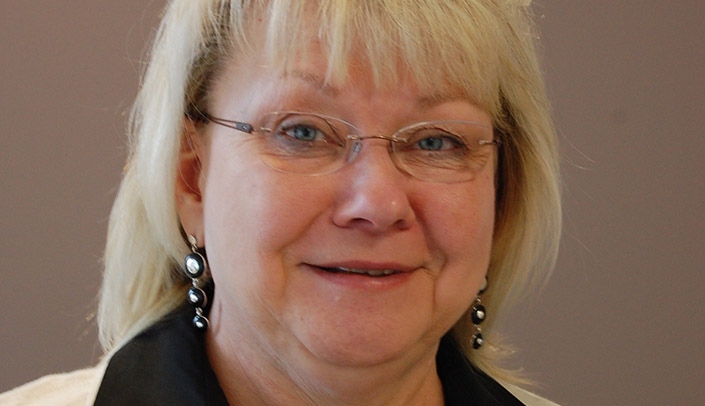Claudia Chaperon, Ph.D., is one of the recipients of the Office of Academic Affairs’ 2019-20 Impact in Education Awards. She will receive the Interprofessional Education Scholar Award.
- Name: Claudia Chaperon Ph.D.
- Title: Associate professor, UNMC College of Nursing
- Joined UNMC: 2005 (worked as clinical instructor and nurse specialist from 1995 to 2005)
- Hometown: Omaha
Why is interprofessional education important in today’s health care fields?
The future of health delivery will involve collaboration within and across teams.
Interprofessional Education Scholar Award
This award recognizes an individual who has made significant contributions to interprofessional education locally, regionally or nationally.
There are few really rigorous studies showing outcomes for patients resulting from interprofessional collaborative practice, but there are promising studies. Interprofessional education research will be a while catching up, too. The methods in pragmatic studies involving diverse populations with changing interventions will begin to improve each year. This is an exciting time for interprofessional practitioners and educators.
The area that most inspires is continued interprofessional practice and education implementation science related to transitional care. There are problems experienced by vulnerable adults transferring from acute care into skilled nursing facilities, other institutions and into their private homes. Injuries, including medication-adverse events, are rampant. Re-hospitalizations are still very high. There are as many as 30% of discharges with serious complications due to acute care and other institutions’ discharge procedures. It seems appalling in this great nation that so much error is tolerated.
Future providers need to learn from effective and inspiring educators and interprofessional teams to develop their competencies for future practice to alleviate issues of safety and dangerously neglectful care. It takes a team, everyone working together to assure all those discharge plans are safe, communication and collaboration with patient and team to assure all of the details are in place.
It is not a one-person process. An effective team is able to communicate, collaborate, trust, be ethical and selfless, and accept patient-centered critique on their individual and collective work to assure best outcomes for a patient. This sort of team speaks to each other clearly; leadership varies from one discipline to another, allowing the knowledge that is most needed to speak and lead. IPCP (interprofessional collaoborative practice) is not a top-down team model. Everyone is an equal participant. This is a wonderful way to practice for the team and their patients.
Describe your proudest moment as an educator.
The most rewarding moments occur when the graduates return to share their implementation of interprofessional transitional care practices. This is so inspiring. Wonderful.
What advice would you give other faculty members who want to have an impact in education?
Believe in yourself in your role of interprofessional practice educator. Surround yourself with highly productive and inspiring teams. Make a difference!
Do you have a favorite quote or philosophy on teaching?
“None of us, including me, ever do great things. But we can do small things, with great love, and together we can do something wonderful.” — Mother Teresa

congratulations Claudia!
Great work, Claudia.
Congratulations!! Super excited for you!
So proud of what you have accomplished. Congratulations.
Congratulations Claudia!